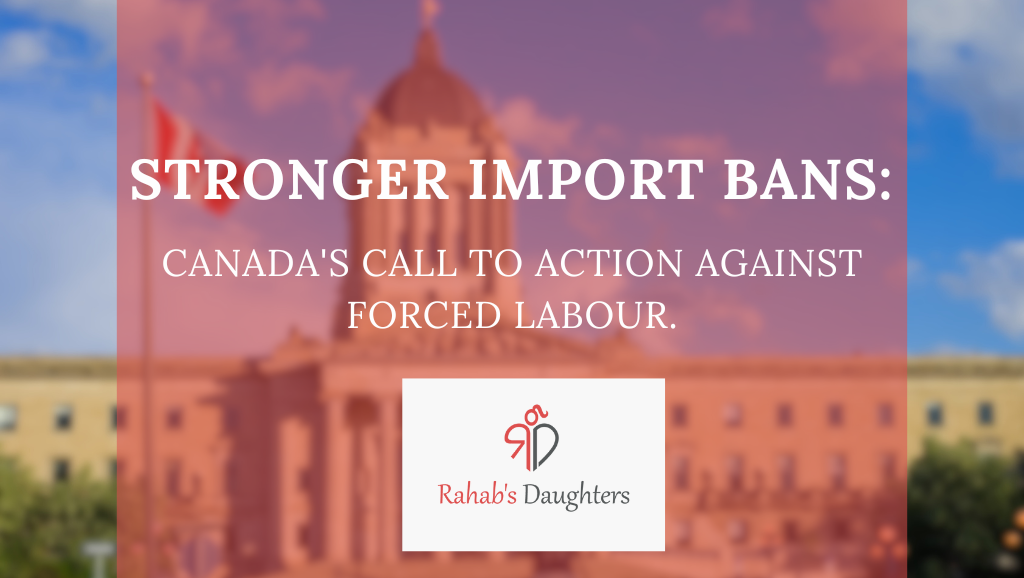Forced labour remains a pervasive issue in global supply chains, exploiting millions of vulnerable individuals worldwide. Despite Canada’s efforts to address this issue, its existing measures lack the strength and enforcement mechanisms needed to make a meaningful impact. Strengthening import bans on goods produced with forced labour is not just a moral imperative but also an essential step in aligning Canada with global best practices.

The Current Landscape
Canada has taken steps to combat forced labour through commitments such as the prohibition of importing goods made with forced labour under the Customs Tariff. Yet, enforcement remains weak. Since the introduction of these measures, only one shipment has reportedly been intercepted. This stark contrast with other nations, like the United States, highlights the gaps in Canada’s approach.
The lack of resources, clear guidelines, and transparency requirements hampers the effectiveness of current laws, leaving Canada vulnerable to becoming a destination for goods tainted by forced labour. Addressing these challenges requires a comprehensive overhaul of policies, enforcement mechanisms, and corporate accountability standards.
Learning from Global Best Practices
Countries like the United States and Australia have implemented robust systems to combat forced labour in their supply chains, providing a roadmap for Canada to follow:
• The U.S. Tariff Act: This law prohibits the importation of goods made with forced labour, supported by the proactive issuance of Withhold Release Orders (WROs) by Customs and Border Protection (CBP). The CBP actively investigates and detains shipments suspected of being linked to forced labour.
• Australia’s Modern Slavery Act: This legislation requires businesses to identify and mitigate risks of forced labour in their supply chains, publishing detailed annual reports on their efforts.
These frameworks emphasize the importance of comprehensive legislation, empowered enforcement agencies, and mandated corporate transparency—pillars that Canada must adopt to strengthen its import bans.
Key Elements of an Effective Import Ban
For Canada to succeed in combating forced labour through import bans, three critical elements must be prioritized:
1. Comprehensive Legislation
The foundation of a successful import ban lies in the strength of its legal framework. Canada must expand its laws to cover all goods produced wholly or partially through forced labour, regardless of where in the supply chain exploitation occurs. This includes:
• Defining forced labour explicitly in legislation.
• Establishing clear criteria and guidelines for identifying and tracking at-risk products.
• Mandating regular reviews and updates to reflect the evolving nature of global supply chains.
2. Empowered Enforcement Agencies
Laws without enforcement are ineffective. Canada must equip its border enforcement agencies with the tools and authority to act decisively. This includes:
• Increased Resources: Allocating dedicated funding for investigations, training, and technology to trace goods’ origins.
• Specialized Training: Equipping officers with the skills to identify high-risk shipments and detect fraudulent documentation.
• Authority to Act: Granting agencies the power to detain shipments, investigate supply chains, and impose penalties on violators.
3. Transparency Requirements
Businesses play a crucial role in ensuring ethical supply chains. Canada should mandate that companies disclose their supply chain practices and efforts to mitigate forced labour risks. Key measures include:
• Requiring annual public reports on supply chain audits and risk assessments.
• Imposing penalties on businesses that fail to comply with reporting requirements.
• Establishing a public database to track corporate compliance, fostering accountability and transparency.
The Benefits of Stronger Import Bans
Implementing stronger import bans offers far-reaching benefits:
• Protecting Human Rights: Ensures that Canadian consumers are not complicit in perpetuating forced labour and exploitation.
• Supporting Ethical Businesses: Levels the playing field for companies that prioritize fair practices over exploitation.
• Enhancing Canada’s Global Reputation: Positions Canada as a leader in combating modern slavery and protecting vulnerable populations.
A Call to Action
The fight against forced labour is a global challenge that requires collective action. Strengthening import bans is a critical step toward eradicating forced labour from supply chains and upholding Canada’s commitment to human rights.
Canada must act decisively by aligning its policies with global best practices, empowering enforcement agencies, and holding businesses accountable. By doing so, it can protect the dignity of millions worldwide and ensure that its markets reflect the values of fairness, justice, and transparency.
Your Support Matters
Together, we can build a future where no product is tainted by the exploitation of human lives.
